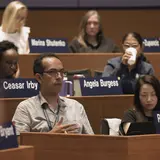Following Up: Robert Stevenson ’21, Florida Panthers
Stevenson, a Navy veteran and graduate of the MBA for Executives Program, helps the Florida Panthers ice hockey franchise improve its facilities and invest in a strong workforce. This season, he cheered on the team as it won its first Stanley Cup.
In this series, we check in with recent Yale SOM alumni to learn how their Yale SOM education has shaped their career paths since graduation.

Tell me about your path since SOM.
When I started the EMBA program, I was working for the hedge fund Point72. I had no plan to switch careers. But I got introduced to the CEO of the Florida Panthers through a mutual friend who said, “They’re looking for someone to fill this specific role, and you popped into my head.” I never thought of working in pro sports in my entire life, but it seemed like it could be worth exploring.
Four months later, I started with the Panthers in a position that oversaw facilities and HR for the entire organization. We have a number of individual companies within the organization, but they all roll up, so I manage HR and facilities for all those subsidiaries. It was a perfect opportunity to have a larger effect on an organization and in a sport that I started playing when I was six and played through college.
What was your experience transitioning from the military to SOM?
I knew that SOM was best in class when it comes to recruiting veterans and giving them the opportunity to go through the program. So I knew there would be other vets, but I also knew it was a really diverse classroom. It’s incredibly important to have that breadth and diversity of thought and experience. SOM was pretty much what I expected it to be, which is a good thing—I had extremely high hopes.
What lessons from Yale SOM have helped on your career path?
There were some great courses in valuing real estate that have given me a very valuable skill set as we think about our real estate portfolio at the Panthers, and where it may head in the future. Being able to build models is really valuable in terms of assessing the physical assets of our buildings, or the return on investment on new technologies we may want to bring in.
I also think about some of our operations lessons in SOM, particularly around queueing. There are organizations and people who consult as queueing experts, but we don’t need that because I’ve taken these courses. I’ve worked with our Business Intelligence team to build models that help with staffing and ingress points depending on projected game attendance. From there, we can start to explore different technologies and infrastructure to get people in the building more efficiently, and then model the expected return on investment on those capital expenditure projects.
Most importantly, SOM provided me with the toolkit to be able to sit at a table of executives with a wide range of experience, skillsets, and areas of responsibility, and know the angles from which they’re viewing the business. Our CEO calls it “being telepathic” as an executive team, and SOM provided the skills to understand, challenge, and support the various viewpoints and priorities of our leadership group, to be “telepathic.”
What was it like to be on the Panthers staff for this year’s historic Stanley Cup win?
People were going bananas when the clock hit zero in Game 7. Some fans have been season ticket-holders for 30 years, and that’s a long time to wait for your team to win the whole thing. Taking my kids down onto the ice after we won was incredible, something they’ll never forget.
For me, it didn’t really set in until I got to hold the Cup. As I was checking the building and preparing to go home around 2 a.m., I passed the locker room and saw everyone in there—the team, the housekeepers, the security guards. The players had literally worked their entire lives for this, and to see that in their faces was magic. I didn’t want to hold the Cup, because I didn’t win it, but Patric Hörnqvist, who just ended his career with the Panthers, handed it to me and took a photo. Being part of that—and then helping to plan the celebration and the parade for all the fans in south Florida—was epic.
What are you passionate about in your work?
I’m looking forward to seeing the growth of the fan base. Hockey as a game is growing in South Florida much faster than the rest of the country, partly because of COVID migration but also because of the success of this team and the breadth of work put in by all of our employees. I’m also excited to see our employees grow; I’m excited for our organization to be one in which people can stay for 10, 15, even 20 years, which isn’t all that common in sports and entertainment.



